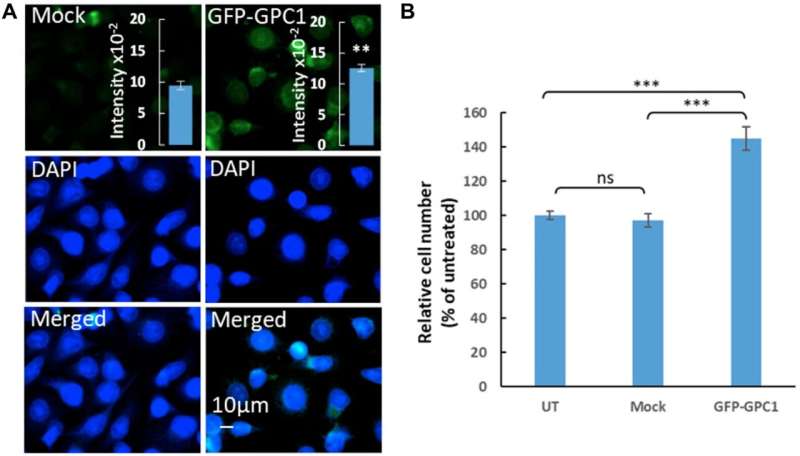This article has been reviewed according to Science X's editorial process and policies. Editors have highlighted the following attributes while ensuring the content's credibility:
fact-checked
peer-reviewed publication
proofread
Attenuation of cancer proliferation by suppression of glypican-1

A new research paper titled "Attenuation of cancer proliferation by suppression of glypican-1 and its pleiotropic effects in neoplastic behavior" has been published in Oncotarget.
Glypicans (GPC1-6) are associated with tumorigenic processes and their involvement in neoplastic behavior has been discussed in different cancer types. In this recent cancer-wide GPC expression study, researchers Fang Cheng, Victor Chérouvrier Hansson, Grigorios Georgolopoulos and Katrin Mani from Lund University and Genevia Technologies used clinical cancer patient data in The Cancer Genome Atlas to reveal net upregulation of GPC1 and GPC2 in primary solid tumors. On the other hand, GPC3, GPC5 and GPC6 displayed lowered expression patterns compared to normal tissues.
The researchers write, "[...] we identify and propose a mechanism where GPC1 interacts with extracellular matrix mediating signal transduction by mitogenic molecules involving TGF-β and p38 MAPK."
Focusing on GPC1, the researchers conducted survival analyses of the clinical cancer patient data that revealed a statistically significant correlation between high expression of GPC1 and poor prognosis in 10 particular cancer types: bladder urothelial carcinoma, brain lower grade glioma, liver hepatocellular carcinoma, colon adenocarcinoma, kidney renal clear cell carcinoma, lung adenocarcinoma, mesothelioma, ovarian serous cystadenocarcinoma, uterine corpus endometrial carcinoma, and uveal melanoma.
In vitro studies targeting GPC1 expression by CRISPR/Cas9 or siRNA or treatment with an anti-GPC1 antibody resulted in attenuation of proliferation of cancer cells from bladder carcinoma, glioma and hepatocellular carcinoma patients (T24, U87 and HepG2 cells). Further, GPC1 overexpression exhibited a significant and negative correlation between GPC1 expression and proliferation of T24 cells. Their attempt to reveal the mechanism through which downregulation of GPC1 leads to attenuation of tumor growth using systematic Ingenuity Pathway Analysis indicated that suppression of GPC1 results in ECM-mediated inhibition of specific pro-cancer signaling pathways involving TGF-β and p38 MAPK. The team also identified differential expression and pleiotropic effects of GPCs in specific cancer types. This emphasizes their potential as novel diagnostic tools and prognostic factors, and open doors for future GPC targeted therapy.
"It is plausible to measure circulating GPCs in serum, plasma or urine using a variety of methods including ELISA, urine cell sediments or exosome isolation. Further, detection and quantification of GPC1 by histopathological and immunohistochemical methods in tumor biopsies could be a new way to predict the biological outcome. The results of this investigation would also emphasize the potential of GPCs as novel tumor antigens, and open for GPC targeted immunotherapy. GPC targeted immunotherapy would be of high value, especially as we move into an era of precision and personalized cancer therapy," the research team concludes.
More information: Fang Cheng et al, Attenuation of cancer proliferation by suppression of glypican-1 and its pleiotropic effects in neoplastic behavior, Oncotarget (2023). DOI: 10.18632/oncotarget.28388



















